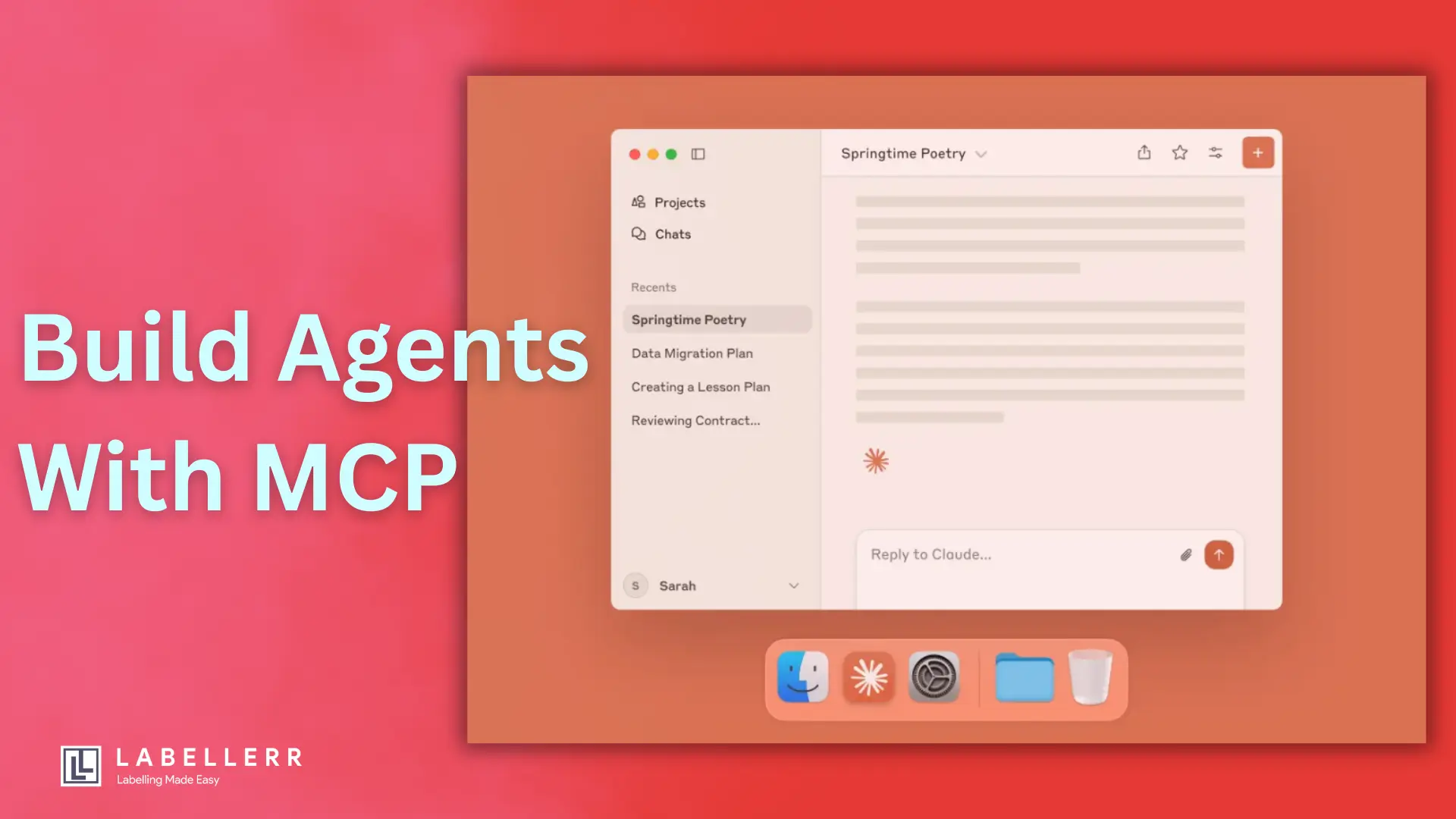Built My First AI Agent Using MCP!!
Building your first AI agent is now more accessible with the Model Context Protocol (MCP). This article guides you through the process, highlighting how MCP standardizes interactions between AI models and external tools, streamlining development and integration.

In my previous blogs, you've seen me struggling to build an AI agent. Today I found a robust solution by building an AI agent using the Model Context Protocol (MCP) with Claude Desktop.
At Labellerr, my goal was to automate the tedious process of monitoring social media platforms for posts related to data annotation help, checking hourly and receiving instant notifications.

Posts Example
Previous attempts with other tools were hindered by significant obstacles:
- Custom Python/React Agent
- Blocked by OAuth complexities, rate limits, and expensive API costs.
- Manus AI Agent
- Overpromised capabilities, required confusing configurations, hallucinated deployment links, and was costly.
- GenSpark AI
- Sleek UI but limited to dummy data, unable to fetch real posts or handle logins properly.
These tools struggled with real-world integration, authentication, and reliable API access, often failing to deliver on their promises or providing non-functional outputs.
This guide provides a comprehensive, technical walkthrough for automating the monitoring of LinkedIn, X, and Reddit for posts about data annotation help, addressing the challenges faced with other tools and highlighting MCP’s unique advantages.
What is MCP?
.webp)
Model Context Protocol
The Model Context Protocol (MCP), developed by Anthropic, is an open standard that enables large language models (LLMs) like Claude to interact dynamically with external tools, databases, and APIs through a standardized interface.
Unlike other platforms, MCP provides a secure, extensible bridge between Claude and external systems, maintaining conversational context for relevant responses.
Key Advantages of MCP
- Contextual Awareness: Claude retains the full conversation history, ensuring responses align with user intent.
- Bidirectional Communication: Supports complex, multi-step workflows, allowing Claude to request and process data iteratively.
- Security and Control: Developers define exposed functions, with transparent user permissions.
- Interoperability: Integrates with files, APIs, databases, and webhooks, offering flexibility for diverse applications.
Technical Setup
Building an AI agent with MCP and Claude Desktop involves setting up an MCP server, defining custom functions, and connecting to Claude Desktop. Below is a detailed breakdown of the process.
1. Install Claude Desktop

Install Claude Desktop
- Requirement: Latest version of Claude Desktop, available from Anthropic’s website.
- Process: Download and install the application on your system (Windows, macOS, or Linux). Ensure you have an active Claude.ai account with access to the desktop app.
2. Set Up an MCP Server
The MCP server is a lightweight program that exposes functions to Claude. We’ll use Python with Flask for simplicity, running on localhost:3000.
Server Requirements
- Python 3.11+: Install from python.org.
- Dependencies: Install via
pip install flask requests schedule python-dotenv smtplib.
Environment Variables: Store API keys and email credentials in a .env file:
LINKEDIN_API_KEY=your_linkedin_api_key
X_BEARER_TOKEN=your_x_bearer_token
REDDIT_CLIENT_ID=your_reddit_client_id
REDDIT_CLIENT_SECRET=your_reddit_client_secret
EMAIL_ADDRESS=your_email@example.com
EMAIL_PASSWORD=your_email_password
Server Code
The server implements functions to monitor social media and send notifications. The provided artifact (MCP Server for Social Media Monitoring) includes:
- API Integration: Functions to query LinkedIn, X, and Reddit APIs for posts containing "data annotation help."
- Scheduling: Uses the
schedulelibrary to run checks hourly. - Notification: Sends email alerts using
smtplibwhen relevant posts are found. - MCP Endpoint: Exposes a
/mcproute to handle Claude’s requests.
To run the server:
python server.py
3. Define Custom Functions
The server defines a monitor_social_media function that:
- Queries APIs for each platform using
requests. - Filters posts containing the keyword "data annotation help."
- Sends notifications via email for relevant posts.
Example API call for X:
x_url = "[invalid url, do not cite]
headers = {"Authorization": f"Bearer {X_BEARER_TOKEN}"}
params = {"query": "data annotation help", "max_results": 10}
response = requests.get(x_url, headers=headers, params=params)
4. Connect to Claude Desktop
- Configuration: In Claude Desktop’s settings (experimental features), add the server endpoint.
- Verification: After restarting Claude Desktop, a hammer icon should appear in the input box, indicating MCP tools are available.
5. Automate and Notify
- Hourly Checks: The server’s scheduler runs
monitor_social_mediaevery hour. - Notifications: Emails are sent with post details (platform, content) when matches are found.
Integration with Social Media Platforms
To fetch posts from LinkedIn, X, and Reddit, the server uses their respective APIs, handling authentication and rate limits:
- LinkedInAPI: [LinkedIn API]([invalid url, do not cite])Authentication: OAuth 2.0Notes: Requires developer approval; limited post search capabilities.
- X(Twitter3)API: [X API v2]([invalid url, do not cite])Authentication: Bearer TokenNotes: Free tier allows 1,500 searches/15 minutes; supports keyword searches.
- RedditAPI: [Reddit API]([invalid url, do not cite])Authentication: OAuth 2.0Notes: Use PRAW for easier integration; 600 requests/10 minutes.
Handling Authentication
- OAuth: Implement OAuth flows for LinkedIn and Reddit, storing tokens securely.
- Bearer Tokens: Use X’s bearer token for simpler authentication.
- Environment Variables: Store credentials in
.envto avoid hardcoding.
Rate Limits
- LinkedIn: Limited calls/day; cache results to reduce requests.
- X: Monitor API usage to stay within free tier limits.
- Reddit: Space requests to avoid 429 errors.
Automation and Notification
The server automates monitoring using the schedule library, running monitor_social_media hourly.
When relevant posts are found, it triggers send_notification to send an email with post details. The email includes the platform and content, formatted for clarity.
Advantages Over Other Tools
MCP addresses the shortcomings of previous attempts:
- Real Integration: Unlike GenSpark’s dummy data, MCP fetches real posts via APIs.
- Customizability: Unlike Manus AI’s rigid configs, MCP allows tailored functions.
- Reliability: Overcomes OAuth and rate limit issues faced by custom agents.
- Contextual Responses: Maintains conversation context, unlike fragmented integrations.
Real-World Applications
Beyond social media monitoring, MCP enables:
- File System Access: Read/write files for data processing.
- API Interactions: Fetch market data or trigger webhooks.
- Terminal Control: Run shell commands for automation.
- Complex Workflows: Chain functions for tasks like report generation or code refactoring.
Implementation Challenges and Solutions
- Authentication: Use OAuth libraries (e.g.,
python-oauth2) to simplify flows. - Rate Limits: Implement caching and exponential backoff for API calls.
- API Access: Apply for LinkedIn developer access; use free tiers for X and Reddit.
- Error Handling: Add try-except blocks and logging to ensure robustness.
Future Enhancements
- Database Storage: Save posts to SQLite for historical analysis.
- Advanced Notifications: Add desktop alerts or Slack integration.
- Scalability: Deploy the server on a cloud platform for remote access.
- Real-Time Monitoring: Use WebSockets for instant updates.
Conclusion
Building an AI agent with MCP and Claude Desktop transformed my approach to automating social media monitoring.
By leveraging MCP’s standardized protocol, I overcame the limitations of other tools, achieving reliable, secure, and customizable integration with LinkedIn, X, and Reddit.
The provided server code offers a practical starting point, which you can extend with additional features as needed.
Start with simple functions and expand as you explore MCP’s capabilities, unlocking the full potential of practical AI automation.
FAQs
Q1: What is the Model Context Protocol (MCP)?
The Model Context Protocol (MCP) is an open standard developed by Anthropic that enables AI models to connect seamlessly with external tools and data sources. It acts as a bridge, allowing AI agents to interact with various applications without the need for custom integrations.
Q2: How does MCP benefit AI agent development?
MCP simplifies the development process by providing a standardized method for AI models to access and utilize external tools. This reduces the complexity of building AI agents, making it easier for developers to integrate AI capabilities into their applications.
Q3: What are the prerequisites for building an AI agent with MCP?
To build an AI agent using MCP, you'll need a compatible AI model (such as those from Anthropic or OpenAI), access to MCP servers or clients, and familiarity with integrating APIs. Some platforms, like Microsoft Copilot Studio, offer built-in support for MCP, further simplifying the process.
References

Simplify Your Data Annotation Workflow With Proven Strategies
.png)


